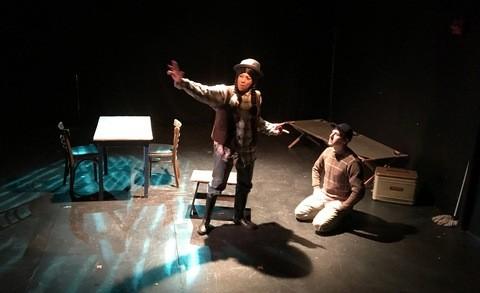The Glen
An adopted young man’s life journey from the 1940’s to the 1950’s and ranging from rural California to decadent Berlin is chronicled in this choppy saga.

Daniel Stompor and Matthew Dalton Lynch in a scene from Peter B. Hodges’ “The Glen” (Photo credit: courtesy of the production)
[avatar user=”Darryl Reilly” size=”96″ align=”left” ] Darryl Reilly, Critic[/avatar]Comprised of 27 short scenes in two parts that are each designated as being two acts and ranging from 1945 to 1954, The Glen is a stewpot of a play inspired by a real person’s life. Glenn Loney (1928-2018) was a drama critic, college professor and author. Mr. Loney’s friend, the play’s author Peter B. Hodges, states in his program note:
There is a lot in The Glen that is more about myself than about Glenn or anyone else, but I can’t imagine that I would have wanted to write this story without his inspiration.
Mr. Hodges offers an intriguing swirling non-linear puzzle of too many well-written pieces. There’s a cavalcade of colorful characters and many compelling incidents but redundancy and vagueness abound. It’s possible that fashioning the skillful dialogue into more exposition could streamline this morass into a work of momentum. Instead, the crammed play maddeningly drags on for two and half hours absent selectivity or a disciplined structure, ultimately making little impact.
In rural Northern California we meet our sensitive teen-age hero Dale Olsen. He is the adopted son of the amiable Kenneth and the ice queen incarnation of Ma Joad, Myrtle. Through ill fortune the family loses their farm and starts over by running a boarding house. After Kenneth’s death, Myrtle oppressively relies on Dale. “The Glen” is the name of the camp ground under her domain by which she intends to shackle Dale with being its manager. Yearning for a more cosmopolitan existence he achieves a scholarship and plans to go away to college and become a drama professor. Myrtle is outraged and carries on with a guilt trip. Dale goes anyway but returns to help out during off-times.

Kerry Mantle and Matthew Dalton Lynch in a scene from Peter B. Hodges’ “The Glen” (Photo credit: courtesy of the production)
The Korean War intervenes. After basic training Dale is embroiled in a second conflict with a malevolent superior officer. That’s resolved through a court case and he is then stationed in Berlin. As he is fluent in German because it was his college minor he is appointed as a teacher in that language to U.S. servicemen. A Crying Game-style subplot of sexual and political espionage ensues followed by confrontations, flashbacks and finally a conclusion. Dark family secrets are revealed as to Dale’s true parentage.
With its atmospheric shades of The Third Man and M. Butterfly, the Berlin sequence is the most fully polished. There’s also a lovely portion following Dale’s high school graduation as a valedictorian with a host of integral characters including a benevolent Native American. Dale’s awakening to his and other’s homosexuality is a major theme that at times confusingly drifts through.
Working on a small scale and with his own unwieldly material, Hodges’ staging functionally gets his play from one scene to another with credible straightforwardness. He has assembled a fine company of actors who bring the many characters to life with flair, some with gender and racial diversity.
The cheery and personable Matthew Dalton Lynch is admirably Herculean with his absorbing portrayal of Dale. Mr. Lynch is intertwined in virtually every moment of the play and his breezy stamina holds it all together.

Matthew Dalton Lynch and Len Rella in a scene from Peter B. Hodges’ “The Glen” (Photo credit: courtesy of the production)
As the passive-aggressive Myrtle, Elizabeth Bove unabashedly revels in the character’s spitefulness. With her steely voice and fierce countenance Ms. Bove vividly conveys the essence of a manipulative Depression-era matriarch. In contrast, the pleasant Len Rella’s performance as the hapless Kenneth is a very James Stewart-style blend of magnanimousness and despair. In addition, Mr. Rella plays several military figures with authority.
In dual roles the captivating Kerry Mantle offers two richly distinctive characterizations. Ms. Mantle brings aching poignancy to the sage Indian Joe and crisp efficiency as Dale’s bureaucratic female defense attorney.
Making a splash as the deceptive Teutonic femme fatale is the vivacious Daniel Stompor in drag. In the male part of a witty army base librarian Mr. Stompor is equally as forceful.
Master character actor Tom Grube is a wily German provocateur, Dale’s folksy nefarious uncle and a vicious major. Mr. Grube disappears into each of these parts with such aplomb that one forgets they’re all played by him. Youthful Barry Anderson winningly portrays a troubled young man taken in by the Olsens who becomes Dale’s confidant. Mr. Anderson has some wonderful emotional outbursts and he and Lynch’s rapport infuses their revelatory exchange with heartfelt depth.
An assortment of cots, tables, chairs, a bar and vintage accessories make up the spare uncredited scenic design that artfully represents the many locales with relative quickness. Brian Pacelli’s able lighting design achieves steadiness and verisimilitude. Hodges’ fine sound design is a lively accompaniment of effects and music of the eras. Costume designer Raxann Chin splendidly provides an array of authentic garments, perfectly visualizing the large dramatis personæ.
This premiere production of The Glen if viewed as a workshop does succeed in revealing its virtues amidst its defects.
The Glen (through February 16, 2019)
The Caravan Theatre Company Inc.
Theatre 54 @ Shetler Studios, 244 West 54th Street, in Manhattan
For tickets, visit http://www.eventbrite.com
Running time: two hours and 30 minutes with one intermission






Leave a comment